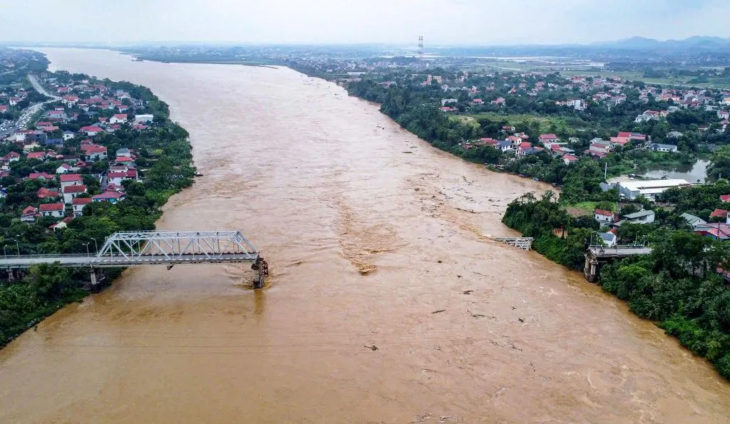A busy bridge in northern Vietnam has collapsed in the wake of super typhoon Yagi, plunging 10 cars and two scooters into the Red River, Deputy Prime Minister Ho Duc Phoc said on Monday.
At least three people have so far been rescued and 13 are missing after the Phong Chau bridge in Phu Tho province collapsed, Mr Ho added. It is unclear if there have been any deaths.
Part of the 375-metre (1230 feet) structure is still standing, and the military has been instructed to build a pontoon bridge as soon as possible.
Yagi, Asia's most powerful storm this year, has killed more than 60 people since it made landfall in Vietnam on Saturday, bringing strong winds of up to 203 km/h (126 mph).
In the days since, the storm has wreaked havoc in northern Vietnam.
At least 44 victims were killed by landslides and flash floods, the country's Ministry of Agriculture and Rural Development said on Monday - a 68-year-old woman, a one-year-old boy and a newborn baby among them.
More than 240 people have been injured, while some 1.5 million are still without power.
The typhoon also tore roofs from buildings and uprooted trees.

Although it has weakened into a tropical depression, authorities have warned of more flooding and landslides as the storm moves westwards.
In the Yen Bai province, flood waters reached a metre (three feet) high on Monday, with 2,400 families moved to higher ground as the water levels rose, AFP news agency reported.
Yagi also sunk and swept adrift dozens of fishing boats. On Sunday, search and rescue personnel found 27 people drifting at sea after a dozen fishermen were reported missing.
Nearly 50,000 people have been evacuated from coastal towns in Vietnam, with authorities issuing a warning to remain indoors.
Schools were temporarily closed in 12 northern provinces, including Hanoi.
Before hitting Vietnam, Yagi left 24 people dead across southern China and the Philippines.
Scientists say typhoons and hurricanes are becoming stronger, more frequent and staying over land for longer due to climate change. Warmer ocean waters mean storms pick up more energy, which leads to higher wind speeds.
A warmer atmosphere also holds more moisture, which can lead to more intense rainfall.
Latest Stories
-
Ghana Football Awards 2025: Abu Kassim, Boatey-Agyei and Mercy Tagoe nominated
28 minutes -
How Ghana’s tax laws help you save with your mortgage
57 minutes -
Asante Gold projects 450,000 ounces of gold from Bibiani, Chirano in 2026
1 hour -
Stakeholders unite to protect vulnerable communities as Ghana charts new path in climate action
1 hour -
Ghana Football Awards 2025: Mary Berko, 3 others nominated for Home-based Footballer of the Year
1 hour -
Court fines painter for insulting neighbour as witch
1 hour -
Mahama calls for transformation of Africa’s mining sector
1 hour -
Asantehene urges mining sector to chart new path towards sustainable development
2 hours -
Ghana Football Awards 2025: Police Ladies, Oaks Ladies and 2 others vie for Female Team of the Year
2 hours -
Fuel prices drop across Ghana as projected – ASEC
2 hours -
Wontumi’s detention: I have blocked Appiah-Kubi; I won’t talk to him again – Gary Nimako
2 hours -
Ghana Football Awards: Salah, Hakimi, Guirassy nominated for best African international
2 hours -
“Ofori-Atta sat by indolently” – Special Prosecutor slams ex-minister for withholding medical updates
2 hours -
Special Prosecutor must clearly explain why Ofori-Atta must appear in person – Martin Kpebu
2 hours -
Dr Charity Binka rallies journalists to highlight the silent epidemic of lifestyle-induced deaths
2 hours

